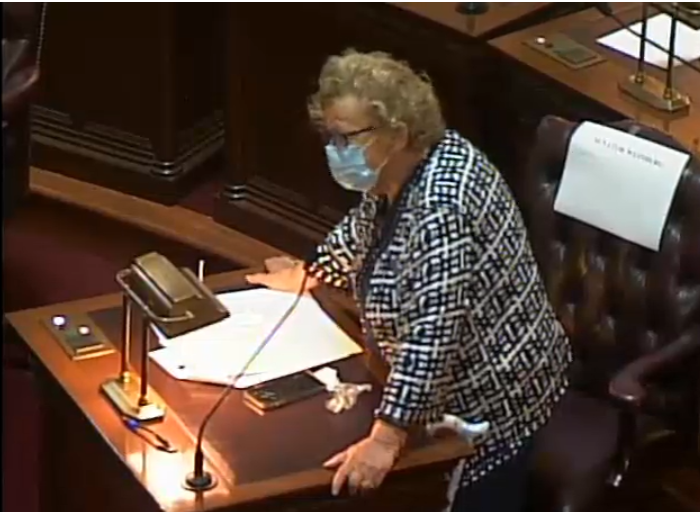Weinberg, Greenstein, Pou to Introduce Legislation Creating Independent Public Advocate for Prisons, Veterans Homes, Psychiatric Hospitals and DDD Centers

Weinberg, Greenstein, Pou to Introduce Legislation Creating Independent Public Advocate for Prisons, Veterans Homes, Psychiatric Hospitals and DDD Centers
Reform bill would create broad-based community advisory boards to provide oversight of prisons and state institutions
TRENTON – Senate Majority Leader Loretta Weinberg and Senators Linda Greenstein and Nellie Pou today announced that they will be introducing legislation to create an independent public advocate with the investigative and legal powers needed to protect the safety and rights of vulnerable populations in state and county correctional facilities, veterans homes, psychiatric hospitals, developmental centers, community-based programs and under state guardianship.
“Over the past year, we have witnessed the failure of the Corrections Department to respond properly to Justice Department findings of sexual abuse and civil right rights violations at the Edna Mahan Correctional Facility for Women, the cover-up of the brutal January 11 assaults on women inmates, and the failure and cover-up by the Department of Military and Veterans Affairs of the shocking wave of Covid-19 deaths at the Paramus Veterans Home,” said Senator Weinberg (D-Bergen).
“Too often, the administrators responsible do everything they can to prevent public disclosure of the crisis or abuse. Clearly, we need a truly independent public advocate to protect the most vulnerable, and we need broad-based community advisory boards at each institution to provide oversight and advocate for those who cannot effectively advocate for themselves,” she said.
The reform bill, developed in consultation with advocates, will also require the establishment of broad-based community advisory boards to provide oversight of each state and county institution, and hold quarterly public meetings with administrators in attendance to discuss issues and complaints.
“When we began investigating the abuses at Edna Mahan, we couldn’t even find any record that the prison’s board of trustees had ever met,” said Senator Greenstein (D-Middlesex/Mercer), who chairs the Senate Law and Public Safety Committee that held hearings on the abuses at Edna Mahan after the U.S. Justice Department Civil Rights Division released its report last April.
“We need boards that include advocates, experts, family members, former inmates or residents, union or staff representatives, and community leaders who know what is happening in these institutions and would hold regularly scheduled public meetings with administrators to discuss issues and complaints,” she said. “If we had such a board at the Paramus Veterans Home, we would have known about the pandemic sweeping through the facility much sooner.”
The senators said the legislation they are developing would create an independent public advocate with broad investigatory powers, the ability to enter institutions at any time and meet with staff and inmates or residents, and the ability to file lawsuits if corrective actions are not undertaken.
“If we had an independent public advocate in place, it is inconceivable that we would still be waiting 10 months later for the Corrections Department or the Administration to agree to a consent order with the Justice Department to implement needed reforms and put federal monitors into Edna Mahan, which Corrections Commissioner Marcus Hicks said he expected to be part of the settlement,” said Senator Pou (D-Passaic).
Unlike the Department of the Public Advocate created as a Cabinet-level agency reporting to the governor – which was abolished twice by governors who objected to its activities – the senators said they are working with the non-partisan Office of Legislative Services to research the best option to provide a bipartisan reporting structure and independence for the new agency, similar to the State Auditor or the State Commission of Investigation.
“One thing we’ve learned from past experience is that the public advocate cannot report to the governor or another Cabinet official,” said Senator Weinberg. “The new agency must be truly independent to be effective – and to survive.”










